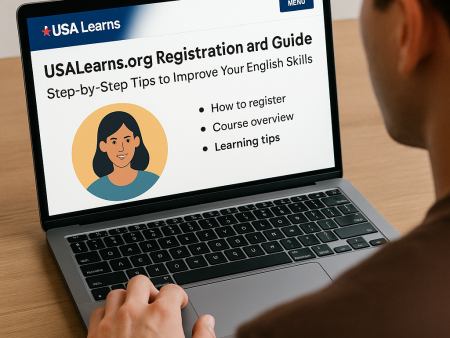Learning English can feel like stepping into a whole new world, but don’t worry—you’re not alone on this journey. Whether you’re starting from scratch or brushing up on the basics, taking those first steps can open doors to endless opportunities. From making new friends to exploring exciting career paths, English is your key to connecting with people across the globe.
Overview Of English For Beginners
Starting with English for beginners requires a focus on simple concepts and practical exercises. Basic English learning revolves around familiarizing yourself with the alphabet, simple words, and common phrases used daily. Immersion in beginner English lessons for adults often involves interactive methods like roleplay or conversation practice.
Learning English for beginners incorporates listening, speaking, reading, and writing skills. To learn basic English faster, prioritize vocabulary. Master essential words like greetings, numbers, and everyday items. Combine this with basic English speaking tasks, such as introducing yourself or asking simple questions.
Learn English for beginners using tools designed for new learners. Apps, online resources, and beginner-friendly textbooks are effective. English lessons for beginners also focus on pronunciation through audio files and repetition exercises. Dedicate at least 15-30 minutes daily for consistent improvement.
Group beginner English lessons can boost confidence and encourage you to practice with others. Instructors often emphasize sentence structure and grammatical basics like verb usage. Small achievements, like forming complete sentences or holding short conversations, keep you motivated.
Key Features Of English For Beginners
Starting your journey with English for beginners involves understanding its fundamental aspects. Focusing on simplified concepts and practical learning methods ensures effective progress.
Simplicity Of Language
English’s straightforward sentence structure makes it accessible for beginners. Start by mastering short sentences like “I am a student” or “This is a book.” Avoid complex grammar rules initially and focus on understanding basic patterns. Learning simple phrases like greetings and common expressions eases day-to-day communication. Short activities, such as repeating basic questions and answers, simplify your learning process.
Grammar And Vocabulary Focus
Key grammar points, such as subject-verb agreement and correct tense usage, help you form sentences accurately. Begin with present tense examples like “She runs” or “He plays.” Build your vocabulary using practical themes like family, numbers, colors, and food. For instance, learn to describe your daily routine with phrases like, “I wake up,” “I eat breakfast,” or “I go to work.” Flashcards and beginner English lessons for adults provide structured ways to memorize essential words and rules.
Interactive Learning Tools
Interactive resources enhance your learning experience. Use mobile apps, language games, and beginner-friendly videos that include subtitles. Practice basic English speaking using conversation simulations available on apps. Engage in learning tools that offer auditory, visual, and speaking exercises to strengthen listening and pronunciation skills. Group-based online classes or discussion forums also support guided practice and encourage you to speak confidently.
These features guide you in establishing a strong foundation. Focus on consistent practice through beginner English lessons and implement these methods for long-term improvement.
Benefits Of Learning English For Beginners
Learning English for beginners opens doors to personal and professional growth. It provides essential skills to navigate a globally connected world confidently.
Career Advancement Opportunities
Proficiency in English, even at a basic level, increases your career potential. Many international companies use English as their primary language, making it essential for job interviews and workplace communication. Beginner English lessons for adults often include vocabulary related to common professional scenarios, such as meetings, presentations, and networking events. Mastering these helps you stand out in industries like tech, hospitality, education, and customer service.
Learning English for beginners also offers access to global educational opportunities. Renowned institutions worldwide provide courses in English, enabling you to learn specialized skills and advance your qualifications.
Travel And Communication Ease
English simplifies international travel by helping you understand transportation schedules, signage, and basic directions. Basic English learning covers essential travel phrases like “Where can I find…?” or “How much is this?” These phrases make navigating new places more manageable.
English also improves your ability to communicate with people worldwide. Many countries teach basic English speaking as part of standard education, making it a common second language. Learning basic English enables you to engage in conversations with locals and other travelers, enriching your experiences.
By starting with beginner English lessons that focus on practical vocabulary and simple grammar, you establish a foundation for effective communication and global exploration.
Challenges Faced By Beginners
Starting your English learning journey as a beginner can be exciting but comes with its own set of challenges. Recognizing these obstacles helps you navigate them effectively in your quest to learn English for beginners.
Common Struggles With Pronunciation
Pronouncing English words correctly is a common difficulty due to varying sounds and accents. English has letters with multiple pronunciations, such as “a” in “apple” versus “name,” making it less predictable. Words borrowed from other languages, like “psychology” or “chaos,” add to the challenge. Stress placement in words, for example, “record” (noun) vs. “record” (verb), can also create confusion. Beginner English lessons for adults often incorporate repeating and mimicking native speakers’ pronunciations to address these struggles.
Interactive tools, such as apps with voice recognition, allow you to practice and improve. Listening exercises using simple, clear audio, such as children’s stories or beginner podcasts, also aid pronunciation refinement. Practicing basic English speaking daily builds both clarity and confidence.
Overcoming Grammar Complexity
English grammar, with its many rules and exceptions, poses challenges for beginners. For example, irregular verb forms like “go” becoming “went” don’t follow predictable patterns. Subject-verb agreement, such as “he runs” versus “they run,” often requires extra focus. Misusing articles (“a,” “an,” “the”) or prepositions (“in,” “at,” “on”) is common among learners.
Beginner English lessons for adults simplify these complexities by introducing key rules gradually. Learning short sentences, like “I am happy” or “She is here,” ensures you develop a solid foundation. Exercises focusing on frequent patterns, such as present tense or common phrases, make grammar less overwhelming. Combining basic practice with engaging content, like grammar games or structured online lessons, reinforces these concepts.
By tackling grammar and pronunciation challenges strategically, your basic English learning experience becomes more manageable and rewarding.
Tips For Beginners To Learn English Effectively
Learning English requires consistent effort and strategic methods to make progress. You can achieve it through practical steps tailored to your goals and learning level.
Building A Daily Practice Routine
Practice daily to improve fluency and retention. Dedicate at least 20-30 minutes each day to learn basic English skills, including listening, reading, writing, and speaking. Focus on short, manageable tasks, like practicing beginner English lessons for adults or reviewing common vocabulary. Incorporate real-life materials, such as menus or signs, to connect learning to everyday experiences. Repetition is key, so revisit lessons regularly to reinforce new information.
Using Technology And Apps
Use apps and digital tools to make learning interactive. Apps like Duolingo, Babbel, and Memrise are excellent for beginner English lessons, providing quick, gamified exercises. Platforms such as YouTube offer free tutorials to learn English for beginners, often with native speaker guidance. Explore online dictionaries with audio features to improve pronunciation. Language learning podcasts also allow you to practice listening skills while multitasking.
Engaging In Conversational Practice
Participate in conversations to build confidence in basic English speaking. Join beginner-friendly language exchange groups in your area or online platforms like Tandem. Practice common phrases and greetings in structured settings, such as guided lessons. Roleplay everyday situations, like shopping or asking for directions, to familiarize yourself with practical scenarios. Speaking regularly helps you overcome hesitation and enhances fluency over time.
Conclusion
Learning English as a beginner is an exciting journey that opens up endless possibilities. With patience, practice, and the right tools, you’ll find yourself making steady progress and gaining confidence. Remember, every small step you take brings you closer to your goals.
Stay consistent, embrace challenges, and don’t be afraid to make mistakes—they’re a natural part of learning. Celebrate your achievements, no matter how small, and keep exploring creative ways to make your learning enjoyable. You’ve got this!










